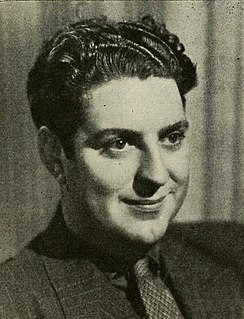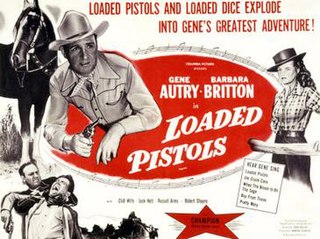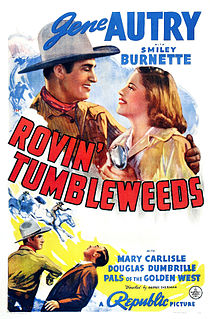Related Research Articles

Orvon Grover "Gene" Autry, nicknamed the Singing Cowboy, was an American singer, songwriter, actor, musician, and rodeo performer who gained fame largely by singing in a crooning style on radio, in films, and on television for more than three decades beginning in the early 1930s. Autry was the owner of a television station, several radio stations in Southern California, and the Los Angeles/California Angels Major League Baseball team from 1961 to 1997.

Carlos Alan Autry Jr., is an American actor, politician, and former National Football League player. During his brief football career, he was known as Carlos Brown. He played the role of Captain Bubba Skinner on the NBC television series, In the Heat of the Night, starring Carroll O'Connor. He has also appeared in films and other television shows. In November 2000, he was elected mayor of Fresno, California, and served for two four-year terms through January 2009. In 2008, Autry was hosting a radio news talk show on KYNO AM 940 in Fresno, but left the station in 2011.
David Hart is an American actor and singer best known for his portrayal of Sgt. Parker Williams on the television series In the Heat of the Night.

Not Another Teen Movie is a 2001 American teen parody film directed by Joel Gallen and written by Mike Bender, Adam Jay Epstein, Andrew Jacobson, Phil Beauman, and Buddy Johnson. It features an ensemble cast including Chyler Leigh, Chris Evans, Jaime Pressly, Eric Christian Olsen, Eric Jungmann, Mia Kirshner, Deon Richmond, Cody McMains, Sam Huntington, Samm Levine, Cerina Vincent, Ron Lester, Randy Quaid, Lacey Chabert, Riley Smith and Samaire Armstrong.

Lester Alvin Burnett, better known as Smiley Burnette, was an American country music performer and a comedic actor in Western films and on radio and TV, playing sidekick to Gene Autry, Roy Rogers, and other B-movie cowboys. He was also a prolific singer-songwriter who is reported to have played proficiently over 100 musical instruments, sometimes more than one simultaneously. His career, beginning in 1934, spanned four decades, including a regular role on CBS-TV's Petticoat Junction in the 1960s.

Carson City is a 1952 American Western Warnercolor film directed by Andre DeToth and starring Randolph Scott, Lucille Norman, and Raymond Massey.

Riders of Destiny is a 1933 pre-Code Western musical film starring 26-year-old John Wayne as Singin' Sandy Saunders, the screen's second singing cowboy. It was the first of a series of sixteen Lone Star Westerns made for Monogram Pictures between 1933-1935, by Wayne and director Robert N. Bradbury, and the first pairing of Wayne with George "Gabby" Hayes.

In Old Santa Fe is a 1934 American Western film directed by David Howard, starring Ken Maynard, George "Gabby" Hayes and Evalyn Knapp and featuring the first screen appearance of Gene Autry, singing a bluegrass rendition of "Wyoming Waltz" accompanied by his own acoustic guitar with Smiley Burnette on accordion. Autry and Burnette were uncredited, but the scene served as a screen test for the duo for subsequent singing cowboy films, beginning with The Phantom Empire (1935), in which Autry had his first leading role.

Harlem on the Prairie (1937) is a race movie, billed as the first "all-colored" western musical. The movie reminded audiences that there were black cowboys and corrected a popular Hollywood image of an all-white Old West.

Steve Pendleton was an American film and television actor. He also went by Gaylord Pendleton as a Broadway performer. He was in more than 220 different films and television episodes. Pendleton appeared in films and on television alongside Roy Rogers, John Wayne, and Gene Autry.
Angelo Pizzo is an American screenwriter and film producer, usually working on films based on a true story, and usually about athletics. He is best known for Hoosiers and Rudy.

Loaded Pistols is a 1948 American Western film directed by John English and starring Gene Autry, Barbara Britton, and Chill Wills. Written by Dwight Cummins and Dorothy Yost, the film is about a cowboy who protects a young man wrongly accused of murder, while trying to find the real badguys.

Face of a Fugitive is a 1959 American Western film directed by Paul Wendkos. It stars Fred MacMurray, Lin McCarthy, Myrna Fahey, James Coburn and Dorothy Green and was based on the short story "Long Gone" by Peter Dawson, the nom de plume of Jonathan H. Glidden. Dawson was the author of 120 Western short stories and novelettes as well as 15 book length Western serials. The working title was Justice Ends with a Gun.

Rim of the Canyon is a 1949 American Western film directed by John English and starring and co-produced by Gene Autry; featuring Nan Leslie, and Thurston Hall. Based on the short story Phantom .45's Talk Loud by Joseph Chadwick, the film is about a horse stolen by escaped convicts and the cowboy who pursues them to a ghost town inhabited by a ghost.

Riders of the Whistling Pines is a 1949 American Western film directed by John English and starring Gene Autry, Patricia Barry, and Jimmy Lloyd. Written by Jack Townley, the film is about a gang of outlaws who are destroying the timberland and who frame a singing cowboy on a cattle-poisoning charge, setting him up for murder.

Melody Trail is a 1935 American Western film directed by Joseph Kane and starring Gene Autry, Ann Rutherford, and Smiley Burnette. Written by Sherman L. Lowe and Betty Burbridge, the film is about a singing cowboy who goes after the men who kidnapped the baby he should have been babysitting. The film features the songs "On the Melody Trail", "A Lone Cowboy on the Lone Prairie", and "Western Lullaby".

Rootin' Tootin' Rhythm is a 1937 American Western film directed by Mack V. Wright and starring Gene Autry, Smiley Burnette, and Armida. Based on a story by Johnston McCulley, the film is about two cowboys who assume the identities of dead outlaws in order to stop a bunch of cattle rustlers, later discovering that the outlaws are far from dead.

Rovin' Tumbleweeds is a 1939 American Western film directed by George Sherman and starring Gene Autry, Smiley Burnette and Mary Carlisle. Written by Betty Burbridge, Dorrell McGowan, and Stuart E. McGowan, the film is about a cowboy congressman who exposes a crooked politician who is delaying passage of a flood control bill.

Shooting High is a 1940 American Western film directed by Alfred E. Green and starring Jane Withers, Gene Autry, and Marjorie Weaver. Written by Lou Breslow and Owen Francis, the film is about a generations-old feud between two families that is resurrected when the town banker tries to contrsuct a highway through the area bearing a monument to the frontiersman ancestor of one of the families. Shooting High was Gene Autry's first film away from Republic Pictures, his first as a mere co-star, his first without the comic presence of Smiley Burnette since 1934, and his first playing a character other than himself.

The Blazing Sun is a 1950 American western film directed by John English and starring Gene Autry, Lynne Roberts, and Anne Gwynne.